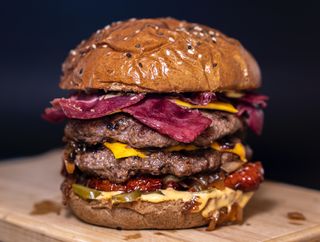Environment
Could What You Choose to Eat Prevent the Next Pandemic?
COVID-19, the environment, and animal suffering point to the same conclusion.
Posted April 24, 2020 Reviewed by Gary Drevitch

When the history of COVID-19 is written, will we list our obsession with eating animals as a major cause that led to a catastrophe of such profound consequence?
Will we have learned from the lesson of the Wuhan “wet market”—where COVID-19 is theorized to have originated—that cramming wild animals into meat markets can be dangerous? Will we have added to that lesson the one about the H1N1 swine flu of 2009 that originated in an intensive pig confinement operation in North Carolina? Will we have also added both these lessons to the H5N1 bird flu lesson of 1997, in which yet another deadly disease evidently originated in animal farms? Will we have factored in the tens of millions of illnesses each year that come from bacteria-contaminated meat? And will we have finally concluded that confining billions of animals annually into potentially lethal pandemic- and bacteria-breeding grounds can have severe consequences?
When we have carefully compared the number of people who died in the U.S. in April 2020, not only from COVID-19 but also from heart disease, will we notice that the numbers were similar, but that one disease led us to shutter our economy and spend trillions of tax dollars to prevent more deaths, while the other—heart disease, which so much data reveal is largely preventable through reducing or eliminating excessive consumption of meat and dairy—had been exacerbated through tax-subsidized animal agribusiness?
Will we wonder why meat sales surged during the pandemic? Will we have mourned the employees in slaughterhouses who died after hundreds were infected in crowded, dangerous conditions that left no room for safe distancing? Will we have mourned those who died after being exposed to these infected individuals? Will we have also mourned the pigs themselves (or lambs, cows, calves, chickens, and turkeys), the abuse of whom was so cruel that anyone treating a dog or cat the same way would have been guilty of a crime?
When we remember the 50th anniversary of Earth Day that occurred during the pandemic, will we notice how little mention was made of our animal-based diets, which were responsible for so much rainforest destruction, water pollution, and aquifer depletion, as well as being a large contributor to climate change? Will we still disdain vegans, who are now so often disliked in our society?
Perhaps something different will have transpired by the time the pandemic history is written. Maybe we will have finally decided to change our food systems and dietary habits in order to protect ourselves from some future pandemics and other preventable diseases, as well as to reduce the speed of global warming. Maybe we will have resolved to put an end to the animal cruelty that will likely appall future generations.
When our children ask us, “How could you have done such things?” perhaps we’ll admit that for too long we prioritized our tastebuds over the terrible consequences of animal agribusiness. Maybe we’ll be able to add that when we finally decided to change our systems, it turned out not to be so hard. We’ll describe how even the biggest meat companies began producing plant-based proteins that tasted virtually identical to animal flesh, while other companies produced lab-grown meat by growing animal cells, obviating the slaughter of animals and the use of antibiotics in farming, which had contributed to antibiotic resistance that gravely threatened human health.
We’ll tell them that we finally transformed the political systems that had enabled animal agribusiness to influence legislation for so long, and put an end to subsidizing foods that harmed us and the planet.
We’ll point to the sustainable food systems we created that nourished billions of people safely, and simultaneously helped protect other species’ habitats, stem the rate of extinction, and slow the warming of the planet.
We’ll remind them of what, by then, they would already know well—that our educational system (the system underlying all others) had shifted to ensure that they learned how to be solutionaries who could bring their good minds and big hearts to bear on solving real-world problems in ways that enabled all life to thrive.
We’ll be able to tell our children that COVID-19 made us finally change what we put in our mouths to nourish ourselves, and our children will thank us.


